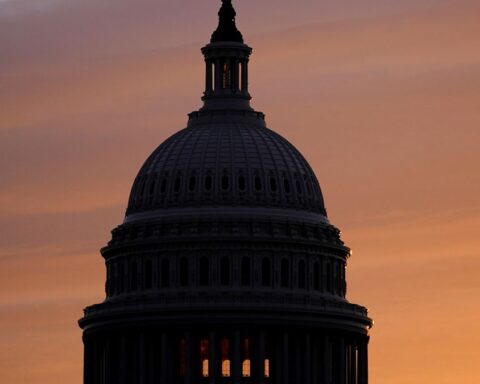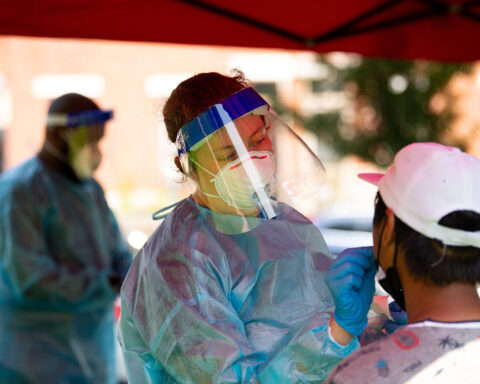But scientists and vaccine makers say the data have not yet had the final word, and there’s still reason to be hopeful.
On Sunday, health officials in South Africa announced a temporary hold on the rollout of the Oxford/AstraZeneca vaccine after a study suggested it offered “minimal protection” against mild-to-moderate Covid-19 due to the variant, the University of Oxford said.
But that yet-unpublished study included a relatively small number of people who were young and healthy on the whole. Crucially, it was not able to measure how effective the vaccine was against severe disease, hospitalization or death.
Dr. Anthony Fauci previously said that keeping people out of the hospital was “the most important thing” from a public health perspective.
“If you can prevent severe disease in a high percentage of individuals, that will alleviate so much of the stress and human suffering and death,” Fauci said during a call with reporters last month.
While researchers in South Africa continue to study the vaccine’s impact on hospitalization there, AstraZeneca believes it will prove to be effective against the variant when it comes to severe disease, a spokesperson told CNN in a statement Sunday.
Until more data becomes available, scientists are piecing together the puzzle with findings from clinical trials and the lab — each offering a different but incomplete view of how the variant might impact Covid-19 vaccines.
Clinical trials in South Africa
Before the AstraZeneca announcement, both Johnson & Johnson and Novavax had seen lower vaccine efficacy in South Africa.
Novavax recently announced its vaccine was 89% effective against symptomatic Covid-19 in a Phase 3 UK trial, but it only appeared 49% effective in a separate Phase 2b study conducted in South Africa. The latter rose to 60% when looking only at HIV-negative individuals.
Similarly, in Johnson & Johnson’s Phase 3 trial, efficacy against moderate-to-severe disease differed by country: 72% in the US versus 57% in South Africa.
In both trials, 90 to 95% of cases in South Africa were linked to the variant, also known as B.1.351.
The silver lining: Johnson & Johnson’s trial showed that its single-shot vaccine was indeed effective against severe disease across the board.
“Across all geographies, across all variants, we see 85% protection” against severe disease, Dr. Mathai Mammen, the company’s global head of research and development, previously told CNN. Plus, from one month after the shot, all hospitalizations and deaths occurred in the placebo group.
These results from Johnson & Jonhson have buoyed hope for AstraZeneca, as well.
“These two vaccines use a similar sort of technology,” Dr. Shabir Madhi, professor of vaccinology at the University of the Witwatersrand in South Africa, told the BBC Monday.
Both vaccines use another type of virus — an adenovirus — as a shell that carries genetic instructions into the human body, leading to an immune response. Johnson & Johnson uses a weakened common cold adenovirus, while AstraZeneca has modified one from chimpanzees.
“So I think extrapolating from that, there’s still some hope that the AstraZeneca vaccine might well perform as well as the Johnson & Johnson vaccine in a different age group demographic that are at risk of severe disease,” Madhi said.
Research in the lab
While clinical trials have given a bird’s eye view of vaccine efficacy, lab research has focused on the variant’s mischief at a level that’s invisible to the naked eye.
Coronaviruses are known to mutate, generally in ways that are harmless to humans. But every now and then a mutation pops up that makes scientists look twice. These mutations can cause changes in the spike protein — the protein the coronavirus uses to attach to human cells and infect them. The spike protein is also a key target of the antibodies we create in response to vaccines.
A number of lab studies have suggested that antibodies from vaccinated people are less effective at “neutralizing” the variant from infecting cells in the lab. But that doesn’t mean the virus has completely escaped.
Oxford’s announcement this week said that neutralization activity against B.1.351 was “substantially reduced when compared with the original strain of the coronavirus.”
Similar results have been seen, albeit to varying degrees, across “almost every one of the vaccines that have been studied against this variant in different ways, either in the laboratory or in clinical studies,” Dr. Salim Abdool Karim, the chair of the South African government’s coronavirus advisory panel, previously told CNN.
Many lab studies have looked at synthetic viruses engineered to carry key mutations in B.1.351, while some research has tested the full live virus. Experts say the latter offers a more complete picture of how the variant’s mutations might interact with each other and have combined effects.
Scientists have often focused on a mutation called E484K, which appears to help the variant escape some of the protection offered by antibodies. This mutation is also part of the genetic signature of the P.1 variant first linked to Brazil, and it has cropped up in a handful of cases of a different variant that’s common in the UK.
The issue with lab studies, however, is that it’s hard to know whether less neutralization in the lab means less protection in real life.
“When you look at the studies done in labs, there was less neutralizing activity against the South Africa strain,” vaccine expert Dr. Paul Offit told CNN after Novavax and Johnson & Johnson shared their results. Those trials appeared to confirm earlier lab findings, he said.
Offit, who advises the US Food and Drug Administration on vaccines, said the two vaccines currently authorized in the US — Moderna and Pfizer — could also be somewhat less effective against the variant. Last year, these two vaccines showed upward of 94% efficacy against symptomatic Covid-19, with perhaps even higher efficacy against severe cases. But those results largely came before variants like B.1.351 were known to be widely circulating.
For now, much of what we know about about Moderna and Pfizer’s effectiveness against the variant comes from lab research. Both companies have signaled they believe their vaccines will still protect against the variant.
“It’s really hard to compare numbers head-to-head right now without running a study with two vaccines,” said Johnson & Johnson’s Mammen.
Booster shots
The spotlight on antibodies, however, may leave out much of the complexity of our immune systems — which can adapt to threats like coronavirus and recruit other cells to the fight, including T cells.
“You can’t see all of that breadth just by looking at antibodies,” said Marion Pepper, associate professor at the University of Washington’s department of immunology.
Still, many of the key players are developing tools to combat variants like B.1.351, which has been found in more than 40 countries and territories around the world, including a handful of cases in the US.
Moderna has announced it will test two separate boosters to its current two-shot regimen: an additional shot of its currently authorized vaccine, and one that’s modified specifically for B.1.351. Pfizer has also said it’s “laying the groundwork” to create a vaccine booster.
Last month, Novavax started developing the next iterations of its vaccine, which may take the form of a booster or a combined “bivalent” vaccine. Johnson & Johnson, whose Phase 3 data came from its one-shot vaccine, is also testing a two-shot regimen.
Similarly, Oxford and AstraZeneca are thinking ahead.
“Efforts are underway to develop a new generation of vaccines that will allow protection to be redirected to emerging variants as booster jabs, if it turns out that it is necessary to do so,” Sarah Gilbert, professor of vaccinology at the University of Oxford, said in a statement Sunday. “We are working with AstraZeneca to optimise the pipeline required for a strain change should one become necessary.
“This is the same issue that is faced by all of the vaccine developers, and we will continue to monitor the emergence of new variants that arise in readiness for a future strain change.”
But there’s no reason to wait for a new generation of vaccines to get one. On the contrary, experts say the emergence of variants makes the vaccine rollout all the more timely: The more people get vaccinated, the more hospitalizations may be prevented, and the less chance the virus has to mutate.
“You need to get vaccinated when it becomes available as quickly and as expeditiously as possible throughout the country,” Fauci said in a virtual news briefing Monday. “Viruses cannot mutate if they don’t replicate. And if you stop their replication by vaccinating widely … you will not get mutations.”





